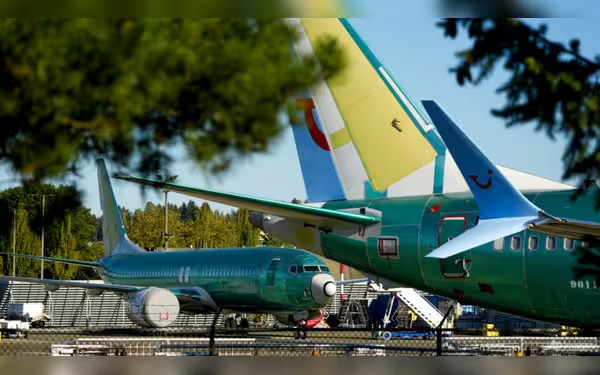Saturday, November 16, 2024 05:30 PM
Boeing Job Cuts and 777X Delay Amid Strike Challenges
- Boeing to cut 17,000 jobs due to financial strain.
- First 777X jet deliveries delayed to 2026.
- Strike costing Boeing approximately $1 billion monthly.
 Image Credits: channelnewsasia
Image Credits: channelnewsasiaBoeing announces 17,000 job cuts and delays 777X deliveries due to ongoing strike and financial losses.
Boeing, the renowned American aerospace company, is facing significant challenges as it announces plans to cut 17,000 jobs, which accounts for 10 percent of its global workforce. This drastic decision comes in the wake of a month-long strike involving 33,000 workers on the US West Coast, which has severely impacted the company’s production capabilities and financial health. The strike has halted the production of key aircraft models, including the 737 MAX, 767, and 777 jets, leading to a projected loss of US$5 billion in the third quarter alone.
CEO Kelly Ortberg, who took the reins of the company in August, communicated to employees that these job cuts are essential "to align with our financial reality." He emphasized the need to reset workforce levels and focus on the company’s priorities moving forward. The layoffs will affect various levels of the organization, including executives and managers, marking a significant shift in Boeing's operational strategy.
In addition to the job cuts, Boeing has announced a delay in the first deliveries of its much-anticipated 777X jet, now expected in 2026. This postponement is attributed to ongoing development challenges, a pause in flight testing, and the current work stoppage. The company had already been grappling with certification issues that had delayed the aircraft's launch.
As Boeing prepares to report its third-quarter earnings on October 23, it anticipates revenue of US$17.8 billion and a loss per share of US$9.97. Analysts had previously expected a cash burn of negative US$3.8 billion, indicating that the company’s financial situation is more precarious than initially thought. The strike is estimated to be costing Boeing around US$1 billion each month, raising concerns about the company’s investment-grade credit rating.
Thomas Hayes, an equity manager at Great Hill Capital, suggested that the layoffs might pressure striking workers to return to negotiations. He noted, "Striking workers who temporarily do not have a paycheck do not want to become unemployed workers who permanently do not have a paycheck." This sentiment underscores the urgency for both parties to reach a resolution.
In a separate development, Boeing has filed an unfair-labor-practice charge with the National Labor Relations Board, accusing the machinists' union of failing to negotiate in good faith. The International Association of Machinists and Aerospace Workers (IAM), representing the striking employees, has dismissed Boeing's claims as unfounded and expressed concern over the company's decision to end the 767 freighter program by 2027.
As Boeing navigates these turbulent waters, it is clear that the path ahead will require strategic decision-making and a commitment to restoring relationships with its workforce. The ongoing strike and the company’s financial losses highlight the delicate balance between operational efficiency and employee satisfaction. For Boeing, finding a way to resolve the current impasse is not just about returning to production; it is about securing its future in a highly competitive industry.













